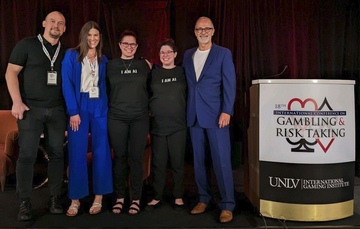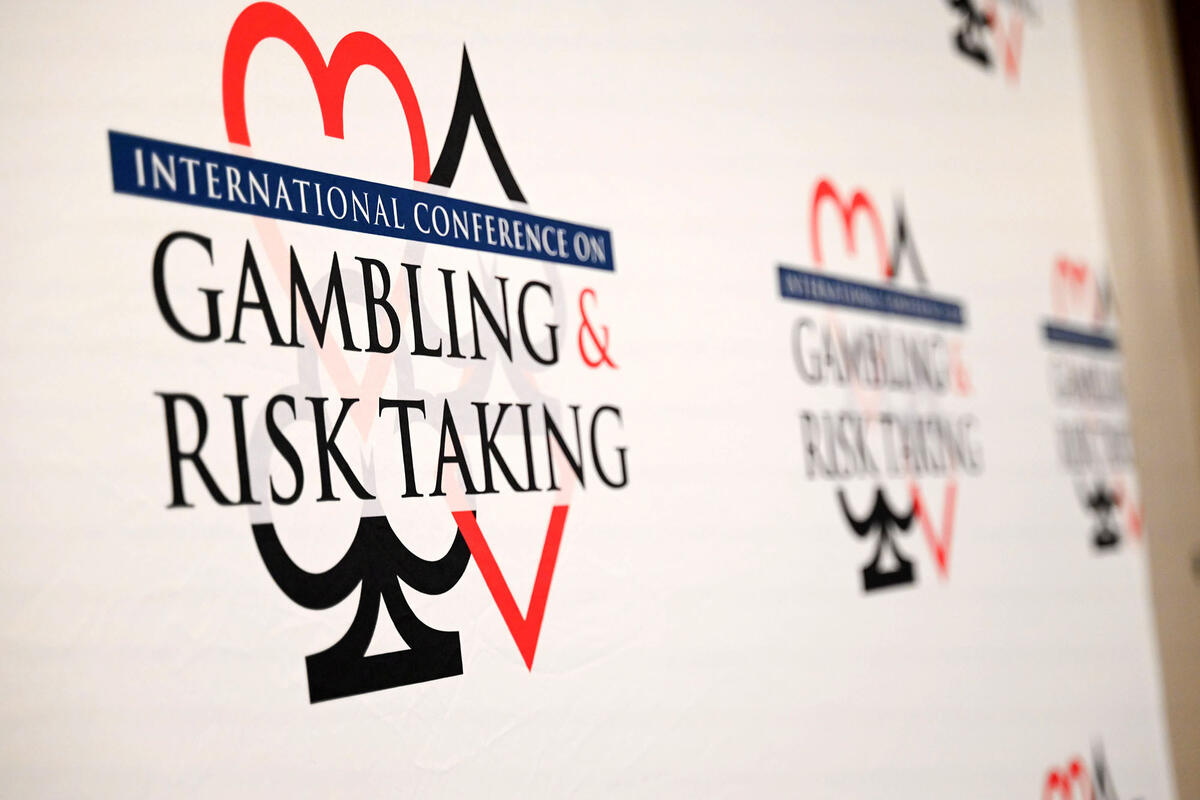Change was in the air at the 18th UNLV Gambling & Risk Taking Conference, one of the oldest academic gatherings focused on issues that impact the gaming industry. Today’s head-spinning pace of societal and technological upheaval shaped the conversations among the 500 participants from around the world.
The fast-growing sports betting industry led to discussions on gambling’s impact on athletes. One of the 50 breakout sessions focused on the challenges that arise as legal cannabis meets legal gambling. Elsewhere, speakers warned that the double-digit growth of online wagering could be at risk without more attention to cyber security.
And there was change at the top of the conference, held May 23-25, 2023, at Park MGM. The event was the first hosted by Brett Abarbanel, who earlier this year became executive director of the UNLV International Gaming Institute, which puts on the once-every-three-years conference.
“It would be hard to imagine a more important or exciting time for this conference,” Abarbanel said. “Our team worked tirelessly to keep the subject matter current with all that’s going on.”

AI and the Gaming Industry
Punctuating the focus on change were the final day’s keynote topic – how artificial intelligence is going to impact gambling. Abarbanel told the audience, “AI can be used in a variety of ways to improve gambling. For example, AI can be used to develop new games that are more challenging, engaging, and can also be used to create more realistic and immersive experiences.”
Or did she? It was, in fact, Abarbanel’s look-alike sister Sara who read an introduction that had been generated by artificial intelligence.
Moderator Robert Rippee, executive director of the Black Fire Innovation Hub, said the slight subterfuge showed that people need to be wary of taking AI-generated information at face value.
“Everything that was said in the introduction, [everything] that our AI Dr. Abarbanel was saying — it could have been completely false. It could have been exaggerated, we're not really sure,” he said. “We have no real context other than most of you believing that was the real Dr. Abarbanel introducing a session here.”
Rippee said the conversational nature of AI chatbots can add to confusion because “as humans, we have the tendency to think it's actually cognitive. It's not.”
Recognizing the inanimate nature of AI and that people are ultimately in control were cited as important mindsets in effectively utilizing the technology.
“Obviously, these tools can be leveraged for good or for evil,” said panelist Tamara Hansen, director of sales for NRT Technology Corp., which develops payment platforms for the gaming industry. “A knife can be used to cut a block of cheese or to stab someone in the heart, AI can be positive or negative.”
Along with asking the industry experts, Rippee queried several of the major AI platforms about the potential impact artificial intelligence could pose for the future of gambling. There was remarkable consensus, which was said not to be a surprise because AI draws from the human-generated content that populates the internet.
Among the possible uses of AI in gaming are optimizing player experiences through analysis of their play, a task far easier for number-crunching machines than for humans.
AI “allows us to scale down to an individual level” to make play more exciting, Rippee said.
The Google AI platform Bard provided a similar answer to questions Rippee had submitted earlier: “AI can be used to personalize the gambling experience for each player, offer tailored promotions and real-time feedback. This can help players feel more engaged,” Bard answered.
The technology could also monitor play for possible indications of problem gambling issues arising, Hansen added. “There's so much potential for AI to help, especially when it comes to problem gambling and identifying repeat behaviors,” she said.
The artificial intelligence platform DaVinci AI, to which Rippee had also submitted a set of questions, made a similar point: “AI can be leveraged to address the issue of problem gambling by identifying early warning signs, providing personalized interventions, and implementing responsible gambling features.”
In coping with the inevitable adoption of more AI-based information, Rippee advised people to be skeptical. He recounted how in preparing for the keynote, he used AI to seek out appropriate academic research on the topic, and that one of the AI platforms produced a realistic-looking article citation that turned out to be completely bogus.
“This is building the case for more guardrails,” he said.
Diversification in the Fun Economy
Attendees were also told that along with more AI, the future is likely to feature more fun.

UNLV Vice President of Economic Development Bo Bernhard led a concluding session on the rise of the Fun Economy, which he defined as “tourism, plus sports, plus entertainment.” He said it is approaching 15% of global economic activity and “something that can no longer be easily dismissed.”
“Those tall buildings on the Las Vegas Strip suddenly don't seem so superfluous anymore,” said Bernhard, who preceded Abarbanel as head of the International Gaming Institute.
Bernhard cited a milestone reached three years ago that was lost amid the pandemic: Tourism by itself has reached 10% of the global economy after hovering at zero throughout the bulk of human existence.
For the first time, "One in 10 units of money that we spent on planet Earth was spent on going from one part of the Earth to another,” he said.
Bernard said driving the Fun Economy and shaping the contours of economic history is the growth of the global middle class. Many demographers predict more than half of the world’s population will soon be middle class, making for “the happiest slowburn story of our time,” Bernhard said.
“And when you join the middle class, what's the first thing that you start to buy?” Bernhard asked. “You start to buy fun, right?”
He said the growth of the Fun Economy is also providing a catalyst for economic diversification in Southern Nevada, citing opportunities the booming sports ecosystem provides. “We're starting to see a sports medicine field diversify from our sports industries,” Bernhard said.
Panelist Tina Quigley, CEO and president of the Las Vegas Global Economic Alliance development agency, said concerns that Las Vegas is putting too many eggs in the tourism basket goes back decades.
She displayed a newspaper clipping from 1970 about an economic analysis written amid concern over a lack of economic diversification in Southern Nevada. The report said Las Vegas should concentrate on providing a world-class hospitality experience.
“They didn't call it the Fun Economy back then,” she said, “but they knew it was a real economy.”
The population in Southern Nevada has grown by more than 2 million people since the report was published.
About the Gambling & Risk Taking Conference
The three-day symposium is often referred to as “the Eadington Conference" in remembrance of its founder, late UNR professor Bill Eadington, who pioneered the academic study of risk-taking and gambling.
Since the first conference in 1974, the event has grown into a premier gathering for interdisciplinary research in the field of gambling studies. It provides a platform for the exchange of ideas and research findings in areas such as psychology, economics, sociology, and public policy. Many of the sessions are devoted to the latest developments in preventing and treating problem gambling.



